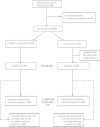Effectiveness of lithium in subjects with treatment-resistant depression and suicide risk: results and lessons of an underpowered randomised clinical trial
- PMID: 25326163
- PMCID: PMC4210495
- DOI: 10.1186/1756-0500-7-731
Effectiveness of lithium in subjects with treatment-resistant depression and suicide risk: results and lessons of an underpowered randomised clinical trial
Abstract
Background: As lithium treatment might be effective in reducing the risk of deliberate self-harm (DSH) in adult patients with unipolar affective disorders, we designed a pragmatic randomised trial to assess its efficacy in more than 200 patients with treatment-resistant depression. However, we randomised 56 patients only. The aim of this report is therefore twofold: first, to disseminate the results of this underpowered study which may be incorporated into future meta-analytical reviews; second, to analyse some critical aspects of the study which might explain failure to reach the target sample size.
Methods: We carried out a randomised, parallel group, assessor-blinded superiority clinical trial. Adults with a diagnosis of major depression, an episode of DSH in the previous 12 months and inadequate response to at least two antidepressants given sequentially at an adequate dose for an adequate time for the current depressive episode were allocated to add lithium to usual care (intervention arm) versus usual care alone (control arm). Suicide completion and acts of DSH during the 12 months of follow-up constituted the composite primary outcome.
Results: Of 58 patients screened for inclusion, 29 were allocated to lithium plus usual care and 27 were assigned to usual care without lithium. Six patients in the lithium plus usual care group and seven in the usual care group committed acts of DSH during the follow-up phase. The survival probability did not differ between the two treatment arms (Chi2 = 0.17, p =0.676). With regard to changes in the severity of depressive symptomatology from baseline to endpoint, no significant differences were detected.
Conclusions: The present study failed to achieve the minimum sample size needed to detect a clinically meaningful difference between the two treatment arms. Consequently, the finding that lithium, in addition to usual care, did not exert a positive effect in terms of reduction of DSH after 12 months of follow-up is likely due to the lack of sufficient statistical power to detect a difference, if a difference existed. The dissemination of the results of this underpowered study will inform future meta-analytical reviews on lithium and suicide-related outcomes.
Trial registration: ClinicalTrials.gov identifier: NCT00927550.
Figures
References
-
- Hawton K, Arensman E, Townsend E, Bremner S, Feldman E, Goldney R, Gunnell D, Hazell P, van Heeringen K, House A, Owens D, Sakinofsky I, Träskman-Bendz L. Deliberate self harm: systematic review of efficacy of psychosocial and pharmacological treatments in preventing repetition. BMJ. 1998;317:441–447. doi: 10.1136/bmj.317.7156.441. - DOI - PMC - PubMed
-
- Hawton K, Townsend E, Arensman E, Gunnell D, Hazell P, House A, van Heeringen K. Cochrane Database Syst Rev. 2000. Psychosocial versus pharmacological treatments for deliberate self harm; p. CD001764. - PubMed
-
- Cipriani A, Girlanda F, Agrimi E, Barichello A, Beneduce R, Bighelli I, Bisoffi G, Bisogno A, Bortolaso P, Boso M, Calandra C, Cascone L, Corbascio C, Parise VF, Gardellin F, Gennaro D, Hanife B, Lintas C, Lorusso M, Luchetta C, Lucii C, Cernuto F, Tozzi F, Marsilio A, Maio F, Mattei C, Moretti D, Appino MG, Nosè M, Occhionero G, et al. Effectiveness of lithium in subjects with treatment-resistant depression and suicide risk: a protocol for a randomised, independent, pragmatic, multicentre, parallel-group, superiority clinical trial. BMC Psychiatry. 2013;13:212. doi: 10.1186/1471-244X-13-212. - DOI - PMC - PubMed
Publication types
MeSH terms
Substances
Associated data
LinkOut - more resources
Full Text Sources
Other Literature Sources
Medical
Research Materials



